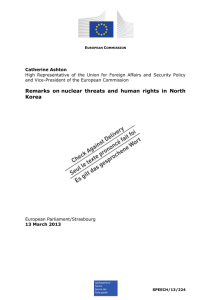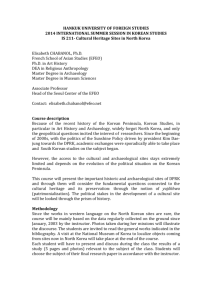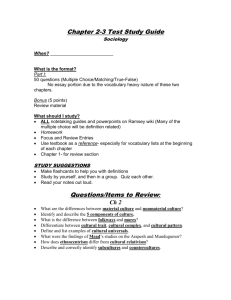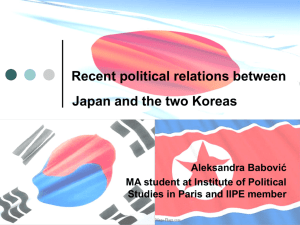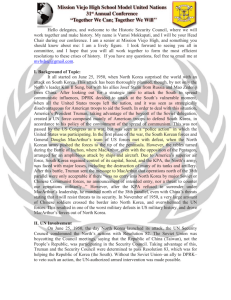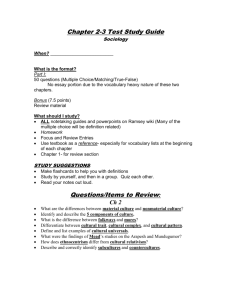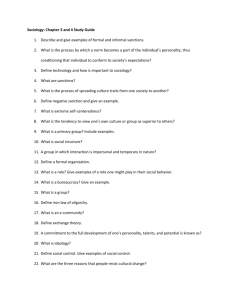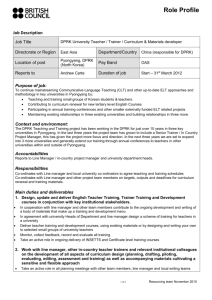I THE MIT JAPAN PROGRAM
advertisement
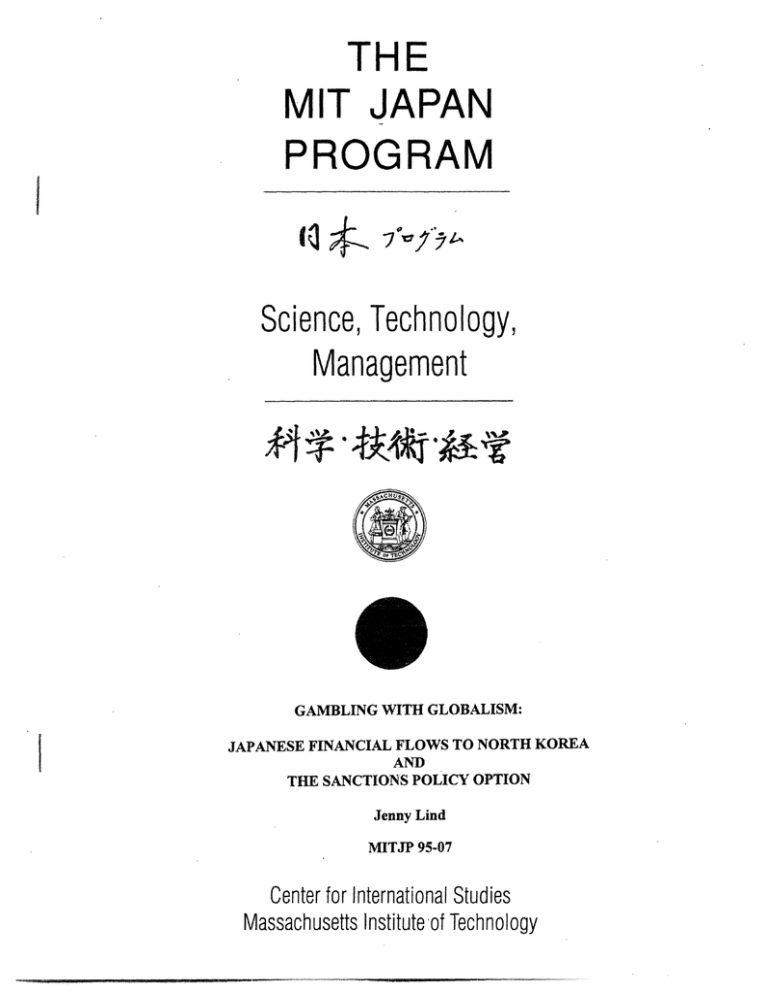
I THE MIT JAPAN PROGRAM - Science, Technology, Management *"%P #Ak~zI · "'P ~ GAMBLING WITH GLOBALISM: I JAPANESE FINANCIAL FLOWS TO NORTH KOREA AND THE SANCTIONS POLICY OPTION Jenny Lind MITJP 95-07 Center for International Studies Massachusetts Institute of Technology -4148"- Distributed courtesy of the MIT JAPAN PROGRAM Science * Technology * Management E38- 754 CenterforInternationalStudies 77 MassachusettsAvenue, Cambridge, MA 02139 Tel: 617-253-2839 Fax: 617-258-7432 Email: <robartimit.edu> ©MITJapan Program GAMBLING WITH GLOBALISM: JAPANESE FINANCIAL FLOWS TO NORTH KOREA AND THE SANCTIONS POLICY OPTION Jenny Lind MITJP 95-07 Jlf About the MIT Japan Program and its Working Paper Series The MIT Japan Program was founded in 1981 to create a new generation of technologically sophisticated "Japan-aware" scientists, engineers, and managers in the United States. The Program's corporate sponsors, as well as support from the government and from private foundations, have made it the largest, most comprehensive, and most widely emulated center of applied Japanese studies in the world. The intellectual focus of the Program is to integrate the research methodologies of the social sciences, the humanities, and technology to approach issues confronting the United States and Japan in their relations involving science and technology. The Program is uniquely positioned to make use of MIT's extensive network of Japan-related resources, which include faculty, researchers, and library collections, as well as a Tokyo-based office. Through its three core activities, namely, education, research, and public awareness, the Program disseminates both to its sponsors and to the interested public its expertise on Japanese science and technology and on how that science and technology is managed. The MIT Japan Program Working Paper Series provides an important means to achieving these ends. - GAMBLING WITH GLOBALISM: JAPANESE FINANCIAL FLOWS TO NORTH KOREA AND THE SANCTIONS POLICY OPTION By Jenny Lind The 1994 Agreed Framework between the United States and the Democratic People's Republic of Korea (DPRK) offers a solution for the North Korean nuclear crisis, yet many problems may stand in the way of its success. If the agreement breaks down, for whatever reason, the U.S. and the Republic of Korea (ROK) have indicated they will press for economic sanctions against the DPRK. Sanctions enacted by the United Nations Security Council would be the most effective, as they would combine the sanctity of international consensus with the sting of China's economic leverage over Pyongyang. China supplies the DPRK with most of its food and oil: a vital link given recent shortages reported in both. 1 However, it is doubtful that China would cooperate in a sanctions effort against its ally. A Chinese veto in the Security Council would prevent the enactment of UN sanctions, and a Chinese abstention would raise issues of sanctions enforcement. 2 Given the difficulty of enacting sanctions against the DPRK in the Security Council, the U.S. has considered sanctions outside the UN. After Pyongyang's announced withdrawal from the Nuclear Non-Proliferation Treaty in June 1994, the Clinton Administration considered a trilateral sanctions package against the DPRK, along with Japan and the ROK. Such a policy was reconsidered in April 1995, when Pyongyang was refusing to accept the ROK as the supplier of the light water reactors promised by the Framework. A discussion of sanctions is likely to resurface again in the event of future problems with the Agreed Framework. In such trilateral sanctions, Japan's role is key. Next to China, Japan is the DPRK's most vital economic link. Money flows from Japan's ethnic Korean community to the DPRK, a cash flow comprising Pyongyang's only source of hard currency aside from exports. In this paper I examine Japan's role in sanctions measures that would include severing this cash flow. What kind of economic leverage does Tokyo wield over Pyongyang, and would it be willing to use it? I will argue that Japanese financial flows are vital to the North Korean economy; their severance would be an essential component of sanctions against the DPRK. However, I find that although Japan would face significant American pressure to participate in a trilateral sanctions regime, it is unlikely to join in sanctions outside UN auspices. Japan's cooperation, however, is important given its aspirations as an international leader. Thus I find Tokyo likely to press as hard as possible to keep the issue in the realm of the Security Council, where Japan's reluctance to participate in sanctions would be overshadowed by China's. JAPAN'S LEVERAGE Money flows to the DPRK from Japan's community of Korean residents, which numbers about 700,000 people 3 (descendants of those Koreans who were brought to Japan for slave labor during the colonial period of 1910-45). An estimated one in three Koreans living in Japan has relatives in the DPRK; those in Japan send 1 their relatives money. 4 A variety of explanations exist for why they do so: according to the General Association of Korean Residents in Japan, Chosensoren,5 it is a simple matter of richer relatives in Japan giving a bit of money to help poorer relatives in the DPRK. Chosensoren says these are personal transactions, and claim the amounts are negligible. 6 Some report a darker motive for the cash flow, suggesting that the money is extorted by the North Korean government. The people who moved to North Korea, and their families who stayed behind, became hostages. Fearing for their relatives' safety, those living in Japan had to keep quiet about the existence of the hostages. To extract financial contributions from those living in Japan, their relatives are threatened. 7 The New York Times quotes a Korean resident of Japan: "Our relatives are hostages...We are sending money in hopes that our relatives will not starve, and that they will not be killed." 8 Others claim that Chosensoren raises funds in Japan on behalf of the North Korean government. In order to hold large events (such as celebrations for Kim Il Sung's birthday, National Independence Day, and international festivals), large amounts of money are required. For Kim I Sung's 70th birthday in 1982, Chosensoren collected and sent 5 billion yen [$50 million] from Japan. Twenty-one individual businessmen who had each donated over 100 million yen were awarded Patriotic Socialist medals in the name of Kim Il Sung. 9 According to another source in the Japanese government, Chosensoren transferred $34 million in pachinko cash on that occasion. 0 The pachinko industry is rumored to be Chosensoren's most lucrative source of donations to Pyongyang.ll In Japan, traditional career routes are often denied to those of Korean ancestry, due to lingering legal and social discrimination; thus they often turn entrepreneurial, and have been very successful in the pachinko gambling business. Sixty percent of pachinko parlor owners are ethnic Koreans, in a booming industry that in 1993 reported aggregate sales of $175 billion. 12 Some say that pachinko parlor owners are "regularly 'taxed' by North Korea to provide funds for Pyongyang festivities.... " 1 3Chosensoren denies that it serves as a link between the pachinko industry and the DPRK. 14 Money is sent from Japan to Korea in two ways: either hand-carried or by bank wire transfer. Most Japanese banks cut their ties to Pyongyang after it defaulted on loans during the 1970's, and more recently on $660 million in Japanese loans in 1984.15 However, "there are 18 banks in Japan authorized to deal with the North, and Japanese officials say they have no idea how much flows through third countries."16 The Mangyongbong 92 ferry that sails three times a month from Niigata, Japan to the DPRK allows visitors to personally deliver money. This ferry carries an annual total of about 15,000 passengers, 17 including business people, students, 2 ___- __ _l_ ___- ·--- _ _ _ A, --^-____x__;l--··D··-·-·--··- ---------- --_--_--._r --_ and people visiting their families. But lax customs restrictions on this route allow for the possibility that more than duty-free cognacs exist among the passengers' gifts to North Koreans. 18 American and Japanese intelligence officials assert that the Mangyongbong's cargo includes everything North Korea's leaders most treasure: millions of yen in hard currency, equipment and spare parts...and off-the-shelf technology to sustain what has become the world's least-secret covert nuclear arms project. 19 Currently, individual visitors from Japan can take as much as five million yen (about $50,000) to the DPRK without a declaration, with unrestricted amounts of foreign currency and traveler's checks. 'Suitcase remittances' thus allow the DPRK easy access to hard currency. 2 0 The amount of money sent every year from Japan to the DPRK, for whatever purpose, is the subject of much debate. Comprised of personal cash deliveries and bank wires (both from Japan and from third countries) the figure is extremely difficult to quantify, and easy to exaggerate in either direction. Gendai Korea, a research institute in Tokyo, released an estimate in 1990 at $600 million; three years later it reported that this estimate was too low, and $2 billion was more accurate. 21 The institute's director, Katsumi Sato -- a former member of Chosensoren -- estimates that about $300,000 per passenger is delivered to people in the DPRK. 2 2 On the other extreme is Chosensoren, which claims the only cash flow is that small amount of money flowing between relatives, and that Sato's estimates are absurd. The number of people who take that kind of money with them when they travel overseas is very few. This total also includes small children, students, and elderly people, which isn't realistic. We just can't believe these figures. People in Japan on a anti-North Korean campaign put out this propaganda and it gets spread by the media. 2 3 Pyongyang also dismisses the estimates of the cash flow as totally inaccurate. Japanese reactionaries and their subsidized media are circulating the fiction of outflow of money from... (Chongryon) to the DPRK and are hysterically crying that it must be checked....The DPRK has owed nothing to Japan up until now. It has lived and can live without Japan's help, and is able to live by its own efforts. 2 4 The most commonly cited estimate of the money flow is about $600 million per year,2 5 which would comprise about 3% of the DPRK's GDP of $22 billion.2 6 This cash flow represents the DPRK's major source of hard currency other than exports; loans will be impossible to obtain given Pyongyang's former defaults, and its external debt estimated at $8 billion.2 7 Despite Pyongyang's denials, without this cash flow, the DPRK would lose one of its few sources of hard currency, and its ties to a $175 billion gaming industry. Japanese sanctions are indeed a potentially 3 14eLss* ----3·----·----··-·3*· ·---- ------------- --------- powerful source of leverage over Pyongyang. This being the case, should the U.S. decide to pressure Pyongyang with sanctions measures, Japanese participation would be essential. Would Tokyo be willing to use the influence it wields? JAPAN'S CASE FOR SANCTIONS: LOOKING OUTWARD First I shall examine the case for sanctions. Japan has an obvious interest in preventing any country in Asia from acquiring a nuclear arsenal. At the very least, it would destabilize the region; at worst, it could threaten Japan directly, given that Japan is within striking distance of the DPRK's Rodong missiles. In an examination of security threats, the Japan Defense Agency's 1995 White Paper identified the DPRK as the number-one threat to Japan's security. It cites North Korean development of nuclear weapons as "not only a problem affecting Japanese security but also a grave problem for international society from the viewpoint of the nonproliferation of weapons of mass destruction." 2 8 Moreover, the thought of a nuclear DPRK is all the more disturbing to Japan in view of Pyongyang's vocal, bitter propaganda against its former colonial masters. Thus given the renewal of a nuclear threat that would result from a failure of the Agreed Framework, a successful sanctions policy would be highly desirable. Theories of cooperation tell us that the most preferable outcome for any country in such a situation is to do nothing while other countries solve the problem. 2 9 Such behavior is problematic for Japan for two reasons. First, given the significance of Japan's participation in a sanctions regime, it is unlikely that a regime enacted without it could exert much pressure on the DPRK. Second, it would exacerbate Japan's reputation as an international free-rider that has taken more than it has given to the postwar international community. Japan's hesitant "checkbook diplomacy" has resulted in criticism from other countries. Thus Tokyo senses pressure not only to adopt recommended sanctions, but to take a proactive role in solving any Asian regional crises. ... Japan's response to the Gulf crisis, exhibiting its familiar clumsiness of being "too little, too late", confirmed the image of Japan as a distinct international anomaly -- an economic great power without commensurate military power and policy leadership. 30 Japan's participation in collective security activities such as sanctions measures would bolster its image as a diplomatic player. Its success in seeking a seat on the United Nations Security Council will be influenced by its actions in international dilemmas such as these. During the 1994 crisis after the DPRK announced its withdrawal from the NPT, it was noted that "...Tokyo's handling of the crisis is widely regarded as the greatest test of its ability to take a leading role in regional security." 31 Perception of threat and international obligations thus would spur Japan to approve sanctions against the DPRK. 4 _________I__C1___I1____ll__·_-- I --~--- ~ ~ L-_l ^·l-_ _ _l~_l - - · -- _ ~- - JAPAN'S CASE AGAINST SANCTIONS: LOOKING INWARD Despite these important incentives for Japan to participate in sanctions, there are significant reasons why sanctions are unlikely to be applied outside the UN framework. 1. Terrorist Reprisals The DPRK is notorious for its proven willingness to use terrorism as a tool of state policy. Though there has not been a recent incident, the 1983 bombing of the South Korean cabinet, the 1988 downing of the KAL airliner, and repeated assassination attempts against South Korean presidents prove that Pyongyang is quite willing to resort to terrorism if it feels that other policy instruments have not produced the desired results. Moreover, Kim Jong Il, said to have masterminded many of these infamous events, is now the DPRK's leader. The Japanese government estimates about 600 North Korean agents live in Japan, "who could launch terrorist attacks if Pyongyang is hit by sanctions over its nuclear row." 32 They claim the professional agents coerce Korean residents in Japan to assist them by threatening the lives of their relatives back in the DPRK. "Holding their relatives as virtual hostages, the professionals could oblige the resident to do their bidding." 3 3 Indeed, the DPRK made no mystery of its reaction to Japanese participation in any sanctions effort. Pyongyang stated that sanctions would be regarded "as a declaration of war, and Japan would be unable to evade a deserving punishment for it.... This is an open revelation of Japan's will to involve itself in another war of aggression on Korea."3 4 Tokyo has thus been warned to expect some form of violent reprisal. Japanese financial flows to the DPRK can also be looked upon as a safeguard. While they continue, Japan is a vital link to the North Korean economy; their cessation, however, is another matter. "Many see the hard-currency channel to Pyongyang as an insurance policy against North Korean hostility." In other words, Pyongyang would be hesitant to "kill the goose that lays the golden eggs." 3 5 Given the DPRK's history of violence, given its recent rhetoric, Japan's hesitance to adopt sanctions is predictable. 2. Interest in Pyongyang's Regime Maintenance Some point out that Japan has an interest in delaying Korean unification. Chung-in Moon writes: "Japan does not simply oppose, but [is] fearful of, a reunified Korea. A delicate synergy of historical distrust, guilt about its militaristic past and concern about possible future relations, all feed Japan's distrust of Korea." 3 6 David Arase agrees with Moon's view: "Whether reunification occurred quickly through conflict, or slowly through absorption, Japan would still face the long-term problem of a heavily armed, reunified Korean nation that has historic as well as current economic grievances to settle with Japan." 3 7 Tokyo denies that such a motive drives its policy making. 5 -.1'....".......".-Ir- II ~ I 1 r l Many Korean people say that Japan opposes Korean unification, but this is not true. Unification has been essential since the US-Japan security treaty was signed in 1960. A war in the Korean peninsula would threaten Japan's security. A unified Korean peninsula will never threaten Japan, unless it has a Communist government. A unified Korea would allow Japan and Korea to share peaceful prosperity. 38 Although Tokyo's true views on Korean unification are mixed, the government is very likely to oppose any policy that would cause unification by sudden regime collapse in the DPRK. Whether or not sanctions would have this effect is difficult to predict. Five years of economic sanctions against Iraq have not succeeded in ousting Saddam Hussein from power. Yet given the DPRK's uncertain state, Tokyo would prefer to avoid a policy that might contribute to collapse of its government, and the resulting refugee exodus and regional destabilization that would ensue. Masao Okonogi notes, "While the majority of refugees would head for China or South Korea, the nearly 100,000 persons (North Korean residents and Japan and their Japanese wives) that returned to North Korea from Japan in the 1960's still have family in Japan." 3 9 Tokyo's fear that sanctions may lead to a regime collapse may keep Japan from participating. 3. Human Rights Issues In the debate over sanctions, Japan's government has noted the delicacy with which it feels it must approach the issue. With a history of colonialism in Korea, and a history of militarism there and elsewhere, Japan would prefer to forget its past. Recent debates on reparations to Korean women who were sex slaves to the Japanese army during World War II, and lingering discrimination against Koreans in Japan are preventing Japan's past from slipping into historic obscurity. The DPRK does not hesitate to bring up the past, as reflected by a statement after the announcement of Japanese support for UN sanctions in 1994: "The entire Korean people can hardly repress resentment at the fact that Japan...is still suppressing and persecuting by means of [the] strong arm Koreans in Japan." 40 Although stopping the Mangyongbong ferry from sailing would be a simple and effective means of cutting a large portion of the cash flow, it would limit the personal freedom of a distinct group of people, namely ethnic Koreans. As a Chosensoren spokesperson stated after a sanctions proposal, "Restrictions on cash remittances and travel by Koreans between Japan and North Korea would raise a grave human rights issue."4 1 While aware of the effect on its own Korean population, Japanese officials also express concern about the effects of sanctions on the North Korean people. "We look at funds different than the United States does. They see this money as something that props up the North Korean government. We see it as largely something from Koreans in Japan to help their families." 4 2 Justification for this view is solid. "A major problem with imposing sanctions on authoritarian regimes is that the greatest pain is imposed on those who have least power." 4 3 Thus in the 6 d_ I --llllll··-·CII_-· ·ii(----·- ----------------- interest of human rights -- towards a people Japan has a history of oppressing -- participation in sanctions would be undesirable. 4. Domestic Politics Many Japanese people are aware of the cash flow from Japan to the DPRK, yet few people would consider it a significant political issue. After Japan announced its willingness to participate in UN sanctions in June 1994, there was little protest. Declining support for Chosensoren, and the fact that second- and third-generation Koreans are less interested in such issues, are said to be responsible. 4 4 Japan's politicians, then, are not under significant pressure from voters in regards to their policy making towards the DPRK. An examination of Japan's political parties and their past connections with the DPRK illuminates further problems with Japanese participation in a sanctions regime. Japan is led by a coalition government comprised of the Liberal Democratic Party (LDP), the Social Democratic Party of Japan (SDPJ), and the New Harbinger Party (Sakigake). At first glance, we would expect a split within this ideologically peculiar alliance. The SDPJ has a long history of support for the North Korean regime, and has been "an effective mouthpiece for North Korean policy in Japan, echoing the North Korean view in the Japanese political process. [SDPJ] leaders have frequented North Korea as intermediaries between Tokyo and Pyongyang...." 4 5 On the other hand, the foreign policy of the LDP is based on traditional, if hesitant, compliance with U.S. and international efforts. Thus one would at first predict that the LDP would be amenable to sanctions, and that policy making would revolve around the inevitable conflict with the DSPJ on the issue. The actual interests of both major parties are not as divergent on the issue of the DPRK as one might expect. This can be seen in the 1989 pachinko money scandal. After the LDP lost badly in upper-house elections that year, it attacked the DSPJ's clean-cut image, taking up charges documented in the weekly magazine Shukan Bunshun . These charges alleged that the DSPJ accepted donations from Chosensoren, which are illegal under laws that prohibit contributions from foreigners. Bunshun also alleged that the DSPJ lobbied against legislation that would crack down on pachinko parlor tax evasion. The magazine claimed that such evasion (estimated at 2 trillion yen, or U.S. $14 billion) 4 6 allowed pachinko owners to send profits to the DPRK. This scandal illuminated that not only the DSPJ, but also the LDP has ties to Chosensoren. When the LDP charged that the DSPJ had received 8 million yen in political contributions from Chosensoren, it quietly dropped the issue after investigations revealed that the LDP had actually accepted 118 million yen of such contributions since 1972. 47 The LDP's Shin Kanemaru, Japan's most influential "powerbroker" before his resignation due to financial scandal, "was a strong supporter of North Korea and reportedly pushed for trade and diplomatic deals favorable to Kim [I1 Sung]. Kanemaru was widely reported to have received extensive financial contributions from Kim [Il Sung]." 4 8 Evidence of Kanemaru's bias can be seen in his leadership of a 1990 mission to the DPRK; under his direction the mission signed a declaration in which Japan 7 I···lllllr(llPECII11111--1-- agreed to pay the DPRK reparations for Japan's colonial occupation, and for postwar damages. When the news broke, it created a furor at home and abroad over what was considered a diplomatic blunder....If Japan extended the scope of compensation from the period of colonial rule to the postwar period, all peace treaties signed with other countries after the war, including the Japan-South Korea peace treaty, would become invalid." 49 Aside from the LDP, the Sakigake party (a small splinter group of the LDP and the other party of the coalition) has also been linked to Pyongyang. Party leader Masayoshi Takemura "developed friendly ties while governor of Shiba prefecture," 5 0 and participated in Kanemaru's 1990 mission while a member of the LDP. Thus, although the centrist/socialist split would appear to be the force behind Japanese policy making in regards to the DPRK, all three parties have personal ties to the regime. Provoking Chosensoren could lead it to reveal potentially embarrassing information about its relationship to the ruling parties. Thus sanctions against the DPRK would be politically difficult. CONCLUSION During the NPT crisis in June 1994, after long debate on the sanctions issue, Japan's Foreign Ministry spokesman Terusuke Terada said, "we have to accept measures adopted by the Security Council and we will implement them." 51 He did not elaborate to explain what Tokyo would do should the U.S. request Japanese participation in sanctions outside the UN framework. But at that time, powerful Japanese politician Ichiro Ozawa said, "If asked by the U.S. to join sanctions without a UN resolution, I am very worried" about whether Japan could enforce the measures. 52 For the reasons outlined earlier, Japan would find it very difficult to support sanctions enacted outside the UN. The damage to relations with the DPRK, to the rights of its own ethnic Korean population, and to its international image would not merit its participation. However, given its Security Council ambitions, Japan would be unwilling to give the impression to the U.S. and others that domestic political and social issues interfere with its ability to act as a decisive international leader. Thus Tokyo's best strategy is to keep the sanctions debate within the UN arena. UN sanctions would be the most effective; Tokyo can reasonably question the efficacy of any sanctions package that does not include China. Also, remaining within the UN framework demonstrates Japanese loyalty to international institutions and law -- crucial given regional concerns about Japanese military resurgence. Indeed, Ozawa said that should Japan act outside the UN, "I am deeply afraid...that the international community would lose trust in Japan." 5 3 Moreover, with the sanctions debate conducted in the UN, a failure to see them enacted would be blamed on China rather than Japan. Given China's announced opposition to sanctions, by forcing the issue to remain in the context of the Security Council, 8 _11_1_ _ r - 11_____^____1_1_____s____ _111··--·1_.1)__-_ ..-1---_ -1 Tokyo shifts the spotlight to China, rather than itself, as a self-preoccupied, would-be international player. UN-approved sanctions would lessen many of the problems associated with an ad hoc sanctions package. Lisa Martin notes, "In coercion cases institutions can facilitate the issue linkages that the leading sender will have to use in order to convince others to cooperate...raising the costs of defection." 5 4 Within Japan, any political costs associated with confronting Chosensoren cannot be compared to those resulting from going against the UN. Japan's concerns about other risks of enacting sanctions would be mollified by the international approbation conferred upon UN activities. Japan should not fear retaliation from the DPRK for its participation in UN sanctions. Pyongyang is unlikely to single out Japan for terrorist reprisals given the number of other countries that would be participating. The DPRK has an interest in maintaining good relations with Japan; Tokyo has agreed to provide the DPRK with 300,000 tons of rice (half of it free of charge), in response to Pyongyang's admittance of a food shortage and request for aid.5 5 Such gifts would hardly be forthcoming in the event of terrorism against Japan. Most importantly, the DPRK is keenly interested in normalizing relations with Tokyo; it is only after diplomatic relations are effected that Tokyo is willing to discuss the issue of reparations to the DPRK, reparations that would provide Pyongyang with a large and much-needed source of hard currency. It is thus in Pyongyang's interest to pursue policies that would expedite rather than delay such negotiations. For these reasons the U.S. should count on Japanese support for UN sanctions measures against the DPRK, but should not expect Tokyo's participation in ad hoc sanctions with itself and the ROK. The Clinton administration has recognized this; in April 1995 officials met with a group of regional scholars who, doubting the viability of the sanctions option, suggested that they "pursue more subtle tactics, such as persuading China, Russia, and Japan to lean on Pyongyang." 5 6 Although the administration quickly pointed out that the experts "don't speak for the government and don't make policy," 57 its consideration of measures other than sanctions indicates that policy makers are aware of the difficulties in forming a viable strategy for pressuring the DPRK in case the Agreed Framework breaks down. 1 Russia was another major supplier of oil to the DPRK, until Moscow began demanding hard currency in payment for its exports in 1991. China now supplies the DPRK with 80% of its oil. Source: South Korean News Agency, April 19, 1993. 2 Robert A. Scalapino, "The Major Powers and the Korean Peninsula," The Korean Journal of National Unification 3 (1994), p. 21. 3 Teruaki Ueno, "Pro-Pyongyang Group Protests Japan Sanction Threat," Reuters North American Wire, June 6, 1994. 4 Jocelyn Ford, Japan Economic Newswire, November 17, 1989. 5 Chongryon, in Korean. An estimated 300,000 ethnic Koreans living in Japan support North Korea. (The Los Angeles Times, December 16, 1993, p. A6). The others are members of Mindan, the pro-ROK organization, or are unaffiliated. 6 Personal interview, Kang Gwang Chu, International Department of Osaka Headquarters of Chosensoren. August 7, 1995. 7Introduction, Kitachosen no Kenkyu: Anata no tonari no kitachosen [A Study of North Korea: your next-door North Korea], special edition No. 221 of Takarajima journal (Tokyo, Takarajima, April 1995). Quotation translated by the author and R. Suzuki. 8 The New York Times, November 1, 1993, p. A12. 9 ·-3ar-r -·-- --- ·-- 9 Ok Sung Soo, "Chosensoren wa nani o yattekita no ka?" [What has Chosensoren done?]Kitachosenno Kenkyu: Anata no tonari no kitachosen, p. 43. 10 Teruaki Ueno, "Hundreds of North Korean Spies in Japan, Source Says," Reuters News Service, June 9, 1994. 11 Pachinko is a game similar to pinball. Although gambling is illegal in Japan, winners receive prizes that may be legally exchanged by a third party for cash. Unsurprisingly, the pachinko industry is rife with rumors of connections to money laundering and organized crime. Ethnic Koreans also comprise large numbers of the Japanese yakuza. 12 The Nikkei Weekly, February 27, 1995. The pachinko industry's statistics are as murky as any about North Korea; Other estimates of this cash industry cite annual revenues of $300 billion (The Wall Street Journal, December 28, 1993, .A10). Charles Smith, "Pachinko Payola," Far Eastern Economic Review, October 19,1989, p. 25. 14 Personal Interview, Kang Gwang Chu, Chosensoren. 15 Quentin Hardy, The Wall Street Journal, June 9, 1994, p. A10. 16 David Sanger, The New York Times, June 14, 1994, p. A12. 17 Teruaki Ueno, June 6, 1994. 18 There is precedent to think that smuggling is occurring between Japan and the DPRK. Katsumi Sato writes of several incidents, including one in 1988 when Chosensoren "tried to send 27 boxes of "clothing" to relatives living in North Korea via the North Korean-registered ship "Samjiyon." The boxes had false bottoms and contained items violating COCOM (Coordinating Committee for Export Control) regulations." Source: "Japanese Components and Yen Produced North Korean Nuclear Weapons," excerpted from Katsumi Sato, Kitachosen Han no Kaku Senryaku (Tokyo: Kobunsha, 1993). 19 The New York Times, June 14, 1994, p. A12. 20 The Wall Street Journal, June 9, 1994, p. A10. 21 Sato, p.13. 22Ibid. 23 Personal Interview, Kim Jyom Sok, Director, International Department of Osaka Headquarters, Chosensoren. August 7, 1995. Quotation translated by the author. 24 Korean Central News Agency, February 15,1994. 25 According to Former Deputy Secretary of Defense Paul Wolfowitz, in U.S. Congressional testimony. (The Los Angeles Times, December 1, 1993). Multiplying the number of ferry travelers by the maximum travel allowance yields a figure of about $750 million in current dollars. This method, however, is misleading. Ferry passengers are not searched; it is likely some take a good deal more, and some a good deal less, than this rule allows. This figure also ignores the activity of the 18 banks in Tokyo that routinely transfer money to Pyongyang (estimated by the Japanese government to send $100 million a year), and the unknown number of transfers via third countries. 6 CIA World Factbook (Washington, DC: Central Intelligence Agency, October 20, 1994). 27 Ibid. 28 Quoted in Reji Yoshida, "Defense Paper Clear on Uncertainties," The Japan Times Weekly National Edition, July 1016, 1995, p.3 . 29 See Lisa Martin, Coercive Cooperation (Princeton: Princeton University Press, 1992), and Kenneth Oye, ed. Cooperation Under Anarchy (Princeton: Princeton University Press, 1986). 30 Eiichi Katahara, "Japan's Changing Political and Security Role," Pacific Strategic Paper 5 (Singapore: Institute of Southeast Asian Studies, 1991), p.18 31 David Sanger, The New York Times, June 9, 1994. 32 Teruaki Ueno, June 9, 1994. 33 Ibid. 34 David Hamilton, The Wall StreetJournal, June 10, 1994, p. A6. 35 Richard Lawless, "Tokyo's Ties to Pyongyang's Threat," The Wall StreetJournal, December 28,1993, p. A10. 36 Chung-in Moon, "The Political Economy of Security on the Korean Peninsula in the Regional Context," in Andrew Mack, ed., Asian Flashpoint: Security and the Korean Peninsula (St. Leonard's, Australia: Allen & Unwin, 1993), p.132. 3David Arase, "New Directions in Japanese Security Policy," in Colin McInnes and Mark G. Rolls, eds., "Post-Cold War Security Issues in the Asia-Pacific Region," Contemporary Security Policy 15:2 (August 1994), p. 48. 38 Personal Interview, Takeo Mori, Deputy Director, Northeast Asia Affairs Bureau, Japanese Ministry of Foreign Affairs. August 28, 1995. Quotation translated by the author and R. Suzuki. 39 Masao Okonogi, "An Uncertain Ten Years: North Korea's Experiment for Survival and the Preferred Policy of Japan," p.7. Presented at the Symposium on North Korea and Prospects for Korean Unification, University of California, San Diego, La Jolla, CA, May 25-27, 1995. 40 David Hamilton, The Wall StreetJournal, June 10, 1994, p. A6. 41 Teruaki Ueno, June 6, 1994. 42 David Sanger, The New York Times, June 9, 1994, p. 1. 43 Andrew Mack, "Nuclear End-Game on the Korean Peninsula," in Marianne van Leeuwen, ed., The Future of the 10 X - InternationalNuclear Non-Proliferation Regime (Dordrect: Martinus Nijhoff Publishers, 1995), p. 21. 44 ersonal Interview, Takeo Mori, Ministry of Foreign Affairs. 45 Robert A. Scalapino, "North Korean Relations with Japan and the United States," in Robert Scalapino and Jun-yop Kim, eds., North Korea Today; Strategic and Donmestic Issues (Berkeley: Institute of East Asian Studies, University of California, 1983), p. .340. 46 Charles Smith, "Pachinko Payola," Far Eastern Economic Review, October 19, 1989, p. 25. 47 Jocelyn Ford, "Pinball Scandal is High-Risk Gamble for Politics," Japan Economic Newswire, November 2, 1989. 48 Teresa Watanabe, "Japan Called Conduit for N. Korea's Military Program," The Los Angeles Times, December 16, 1993, p. A6. 49 Shoichi Oikawa, The Daily Yomiuri, December 6, 1994, p. 6 . 50 Teresa Watanabe, The Los Angeles Times, December 16, 1993, p. A6. 51 quoted in The Los Angeles Times, June 15, 1994, p. A6. 52 Ibid. 53 Ibid. 54 Lisa Martin, p.39. 55 The Japan Times, July 1, 1995, p. 1 . 56 Steve Glain, The Wall Street Journal, April 19, 1994. 57 Ibid. 11 · ------- -
